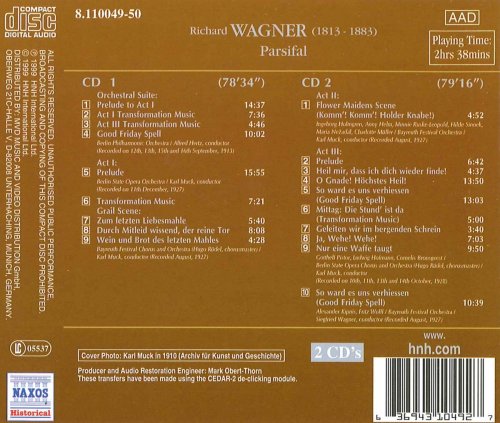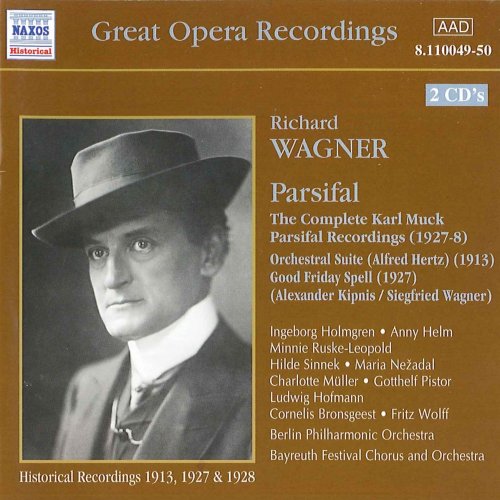
Alfred Hertz, Karl Muck, Siegfried Wagner - Wagner: Parsifal (1999)
BAND/ARTIST: Alfred Hertz, Karl Muck, Siegfried Wagner
- Title: Wagner: Parsifal
- Year Of Release: 1999
- Label: Naxos
- Genre: Opera, Orchestral
- Quality: FLAC (image+.cue,log,scans)
- Total Time: 02:37:45
- Total Size: 660 MB
- WebSite: Album Preview
Tracklist:
1
Orchestral Suite:
01. Prelude to Act I (14:35)
02. Act I: Transformation Music (07:36)
03. Act III: Transformation Music (04:46)
04. Good Friday Spell (10:05)
Berlin Philharmonic Orchestra - Alfred Hertz (conductor)
(Rec. 1913 in Berlin)
Act I:
05. Prelude to Act I (15:57)
Berlin State Opera Orchestra - Karl Muck (conductor)
(Rec. 1927 in the Singakademie, Berlin)
06. Transformation Music (07:16)
Grail Scene:
07. "Zum letzten Liebesmahle" (05:40)
08. "Durch Mitleid wissend, der reine Tor" (08:08)
09. "Wein und Brot des letzten Mahles" (04:28)
2
Act II:
01. Flower Maidens Scene ("Komm'! Komm'! Holder Knabe!") (04:53)
Ingeborg Holmgren, Anny Helm, Minnie Ruske-Leopold, Hilde Sinnek, Maria Nežadál (sopranos); Charlotte Müller (alto)
Bayreuth Festival Orchestra - Karl Muck (conductor)
(Rec. 1927 in the Festspielhaus, Bayreuth)
Act III:
02. Prelude (06:38)
03. "Heil mir, dass ich dich wieder finde!" (04:36)
04. "O Gnade! Höchstes Heil!" (13:50)
05. "So ward es uns verhiessen" (Good Friday Spell) (13:02)
06. "Mittag: die Stund’ ist da" (Transformation Music) (05:00)
07. "Geleiten wir im bergenden Schrein" (03:40)
08. "Ja, Wehe! Wehe!" (07:02)
09. "Nur eine Waffe taugt" (09:54)
Parsifal - Gotthelf Pistor (tenor)
Gurnemanz - Ludwig Hofmann (bass)
Amfortas - Cornelius Bronsgeest (baritone)
Berlin State Opera Chorus and Orchestra - Karl Muck (conductor)
(Rec. 1928 in the Singakademie, Berlin)
10. "So ward es uns verhiessen" (Good Friday Spell) (10:34)
Parsifal - Fritz Wolff (tenor)
Gurnemanz - Alexander Kipnis (bass)
Bayreuth Festival Orchestra - Siegfried Wagner (conductor)
(Rec. 1927 in the Festspielhaus, Bayreuth)

1
Orchestral Suite:
01. Prelude to Act I (14:35)
02. Act I: Transformation Music (07:36)
03. Act III: Transformation Music (04:46)
04. Good Friday Spell (10:05)
Berlin Philharmonic Orchestra - Alfred Hertz (conductor)
(Rec. 1913 in Berlin)
Act I:
05. Prelude to Act I (15:57)
Berlin State Opera Orchestra - Karl Muck (conductor)
(Rec. 1927 in the Singakademie, Berlin)
06. Transformation Music (07:16)
Grail Scene:
07. "Zum letzten Liebesmahle" (05:40)
08. "Durch Mitleid wissend, der reine Tor" (08:08)
09. "Wein und Brot des letzten Mahles" (04:28)
2
Act II:
01. Flower Maidens Scene ("Komm'! Komm'! Holder Knabe!") (04:53)
Ingeborg Holmgren, Anny Helm, Minnie Ruske-Leopold, Hilde Sinnek, Maria Nežadál (sopranos); Charlotte Müller (alto)
Bayreuth Festival Orchestra - Karl Muck (conductor)
(Rec. 1927 in the Festspielhaus, Bayreuth)
Act III:
02. Prelude (06:38)
03. "Heil mir, dass ich dich wieder finde!" (04:36)
04. "O Gnade! Höchstes Heil!" (13:50)
05. "So ward es uns verhiessen" (Good Friday Spell) (13:02)
06. "Mittag: die Stund’ ist da" (Transformation Music) (05:00)
07. "Geleiten wir im bergenden Schrein" (03:40)
08. "Ja, Wehe! Wehe!" (07:02)
09. "Nur eine Waffe taugt" (09:54)
Parsifal - Gotthelf Pistor (tenor)
Gurnemanz - Ludwig Hofmann (bass)
Amfortas - Cornelius Bronsgeest (baritone)
Berlin State Opera Chorus and Orchestra - Karl Muck (conductor)
(Rec. 1928 in the Singakademie, Berlin)
10. "So ward es uns verhiessen" (Good Friday Spell) (10:34)
Parsifal - Fritz Wolff (tenor)
Gurnemanz - Alexander Kipnis (bass)
Bayreuth Festival Orchestra - Siegfried Wagner (conductor)
(Rec. 1927 in the Festspielhaus, Bayreuth)
Karl Muck (1859-1940), one of the greatest Wagnerian conductors of the generation immediately following those who knew and worked directly with the master, was responsible for leading the performances of Parsifal at Bayreuth from 1901 until 1930. Wagner's last opera was, in a word, Muck's property, and this magnificent two-CD set documents his unique and intense relationship with that work in exemplary fashion. It contains Muck's accounts of the Prelude to Act I and a sizable amount of Act III, recorded with the chorus and orchestra of the Berlin State Opera, and of excerpts from Acts I and II, recorded with the chorus and orchestra of the Bayreuth Festival. The recordings, made in 1927 and 1928, reflect the glow of a golden age in Wagner interpretation, and thanks to Naxos's extraordinary job of remastering, that reflection is no longer a dim one.
The great Wagnerian soprano Frida Leider, whose voice is not heard on these recordings, encountered Muck in his later years at Bayreuth and was struck by the slowness of his tempos in Parsifal. Indeed, they are slow: the Act I prelude takes 15:55 by the clock and seems even longer, yet the effect is sublime. Muck sustains the prelude as if on a single breath, just at the point where the pulse almost disappears; the music seems to arise out of silence and darkness to become light and spirit. This is just what Wagner intended. The Act III excerpts, which feature tenor Gotthelf Pistor as Parsifal and bass Ludwig Hofmann as Gurnemanz, are also superb. Pistor's is quite a fine voice--he was a real heldentenor--and the drama is palpable. But the greatest treasure here is the playing of the State Opera orchestra. Muck had been its chief conductor for 20 years, from 1892, and the chemistry between him and his erstwhile colleagues is particularly remarkable. They are majestic in the "Good Friday Spell," and they bring enormous grandeur and radiance to the closing pages of the opera. What a superb band this was!
The segments recorded in Bayreuth are only a little less enchanting, largely because the chorus preparation leaves a lot to be desired (the chromaticism in Wagner's writing was difficult then, and still is). But we hear the original Bayreuth bells in the Act I transformation music (they were carried up to Berlin for the Act III processional music as well); cast to Wagner's own specifications, and melted down for the German war effort in 1940, they are truly a "voice" from the past.
The two discs are superbly laid out, and include, in addition to the Muck material, a four-part orchestral suite from Parsifal conducted by Alfred Hertz and recorded in 1913 with the Berlin Philharmonic, as well as the "Good Friday Spell" played by the Bayreuth Festival Orchestra under the direction of Siegfried Wagner, the composer's son, recorded in 1927. The transfers by Mark Obert-Thorn are the best yet of these historic recordings. --Ted Libbey
The great Wagnerian soprano Frida Leider, whose voice is not heard on these recordings, encountered Muck in his later years at Bayreuth and was struck by the slowness of his tempos in Parsifal. Indeed, they are slow: the Act I prelude takes 15:55 by the clock and seems even longer, yet the effect is sublime. Muck sustains the prelude as if on a single breath, just at the point where the pulse almost disappears; the music seems to arise out of silence and darkness to become light and spirit. This is just what Wagner intended. The Act III excerpts, which feature tenor Gotthelf Pistor as Parsifal and bass Ludwig Hofmann as Gurnemanz, are also superb. Pistor's is quite a fine voice--he was a real heldentenor--and the drama is palpable. But the greatest treasure here is the playing of the State Opera orchestra. Muck had been its chief conductor for 20 years, from 1892, and the chemistry between him and his erstwhile colleagues is particularly remarkable. They are majestic in the "Good Friday Spell," and they bring enormous grandeur and radiance to the closing pages of the opera. What a superb band this was!
The segments recorded in Bayreuth are only a little less enchanting, largely because the chorus preparation leaves a lot to be desired (the chromaticism in Wagner's writing was difficult then, and still is). But we hear the original Bayreuth bells in the Act I transformation music (they were carried up to Berlin for the Act III processional music as well); cast to Wagner's own specifications, and melted down for the German war effort in 1940, they are truly a "voice" from the past.
The two discs are superbly laid out, and include, in addition to the Muck material, a four-part orchestral suite from Parsifal conducted by Alfred Hertz and recorded in 1913 with the Berlin Philharmonic, as well as the "Good Friday Spell" played by the Bayreuth Festival Orchestra under the direction of Siegfried Wagner, the composer's son, recorded in 1927. The transfers by Mark Obert-Thorn are the best yet of these historic recordings. --Ted Libbey

Download Link Isra.Cloud
Alfred Hertz, Karl Muck, Siegfried Wagner - Wagner: Parsifal (1999)
My blog
Alfred Hertz, Karl Muck, Siegfried Wagner - Wagner: Parsifal (1999)
My blog
Classical | FLAC / APE | CD-Rip
As a ISRA.CLOUD's PREMIUM member you will have the following benefits:
- Unlimited high speed downloads
- Download directly without waiting time
- Unlimited parallel downloads
- Support for download accelerators
- No advertising
- Resume broken downloads


